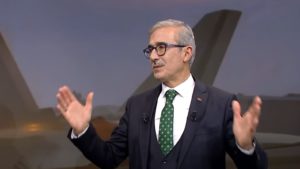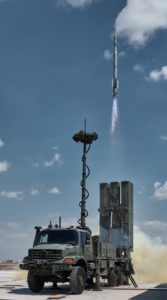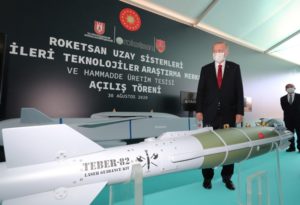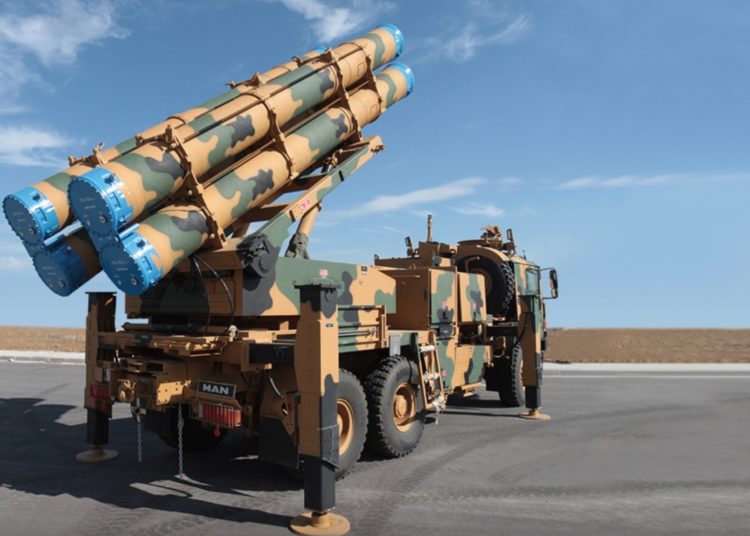Abdullah Bozkurt/Stockholm
Turkey has secret arms projects and has developed new capabilities that would neutralize any threat from abroad, according to revelations made by Turkey’s top defense industry official.
“I can say very clearly that we will have elements in the field that will have the effect of surprise and that will deal with and neutralize the capabilities of opponents whomever they are,” said İsmail Demir, head of the Presidency of the Defense Industry (Savunma Sanayii Baskanligi, SSB), Turkey’s top defense procurement agency, in an interview with a local TV station on December 17, 2021.
“I emphasize that we have a lot of work to do, and we have a long way to go, but when we look at what’s going on around us, those who think Turkey is an easy target will regret it,” he added.
Demir’s remarks were interpreted by the interviewer in the live broadcast to say that Turkey is pursuing more secret arms and defense projects than it publicly announces, a comment that Demir did not refute.
Demir, already designated under sanctions by the United States, has a multi-billion dollar defense industry budget and works directly with Turkish President Recep Tayyip Erdoğan, who often brags about how the Turkish defense industry has developed in recent years, reducing dependence on foreign countries to 20 percent.
It is not clear what those secret projects are, but it’s obvious that Turkey has mobilized its resources, allocated significant funds, hired more engineers and signed more contracts with local industry to enhance its military capabilities in recent years.

The Erdoğan government is at odds with a number of regional countries including Greece, Egypt and Israel as well with major powers such as Russia and the United States. President Erdoğan often depicts the West as an enemy in his speeches and accuses the US and its allies of harboring imperialist ambitions towards Turkey. Ankara has clashed with Russia over its involvement in Syria, Libya and the Caucasus and provides armed drones to Ukraine to counter the Russian threat.
Demir’s comments on the hitherto unknown capabilities Turkey has acquired and is ready to put to use in the event of a conflict is likely connected to the missile technology Turkey has been endeavoring to develop in the last decade.
Demir also said in the interview that Turkey has an advanced-stage, long-range missile program that he claimed has nearly reached the level of SAMP/T missiles produced by French-Italian partnership Eurosam. He added that more testing is required to make sure the system works without glitches when it is delivered to the Turkish Armed Forces. Asked about the range of the missiles, Demir declined to respond, citing the need for secrecy.
In connection with advanced missile technology programs, the Turkish government has also come under the spotlight in recent years, with many asking if Turkey has clandestine weapons of mass destruction (WMDs) including a nuclear device for deterrence. The controversy grew further when Erdoğan publicly challenged Turkey’s commitment to the Non-Proliferation Treaty (NPT), to which Turkey is a party.

In March 2018 Erdoğan vowed to acquire advanced military hardware including nuclear missiles when comparing Turkey’s military capabilities to those of the US, saying that Turkey has God on its side and that his people march for martyrdom, unlike the Americans. In April 2018 Erdoğan slammed then-Israeli Prime Minister Benjamin Netanyahu while branding Israel as a terrorist state and warned that Netanyahu should not be bragging about possessing nuclear weapons in his arsenal as they would be rendered ineffective when the time comes.
The most shocking statement came on September 4, 2019, when Erdoğan said: Some countries have missiles with nuclear warheads, and not just one or two. But [they tell us] we can’t have them in our hands. This I will never accept.
People close to Erdoğan echoed similar ambitions for nuclear weapons as well. In January 2018 Foreign Minister Mevlut Çavuşoğlu criticized the US and said the US cannot ask others to give up nuclear weapons while keeping its nuclear arsenal. In November 2020 Mesut Hakkı Caşın, the Turkish president’s advisor on security and foreign policy, said Turkey would hire engineers around the world including nuclear scientists to serve the Turkish government’s interests. “Turkey must have nuclear weapons, ICBMs, then nobody will be able touch us just like North Korea,” said Cem Küçük, a leading Erdoğan government propagandist who paraded on TV networks preaching to the choir in April 2020.

It appears Erdoğan also secured religious approval for his crusade to acquire WMDs. Hayrettin Karaman, the Turkish president’s chief fatwa (religious edict) giver, provided not only his blessing for the government to acquire WMDs but also encouraged Turkish leadership to do so. Karaman, considered to be the Turkish equivalent of imam Yousef Qardawi — the Egyptian cleric and spiritual leader of the Muslim Brotherhood who approves of suicide bombings and armed rebellion in Syria — and a prominent figure among Turkish Islamists, wrote in the Yeni Şafak daily on March 16, 2017 that “we need to consider producing these weapons [WMDs] rather than purchasing them without losing any time and with no regard to words [of caution] and hindrance from the West.”
Against this backdrop there is a real concern that the Erdoğan government may be planning to deliver all types of payloads including WMDs with the advanced longer-range missiles it has been trying to develop for some time. The SSB and its domestic partners already have an ongoing project called SIPER, a long range defense system, which Turkish officials claim will be completed in 2023.












